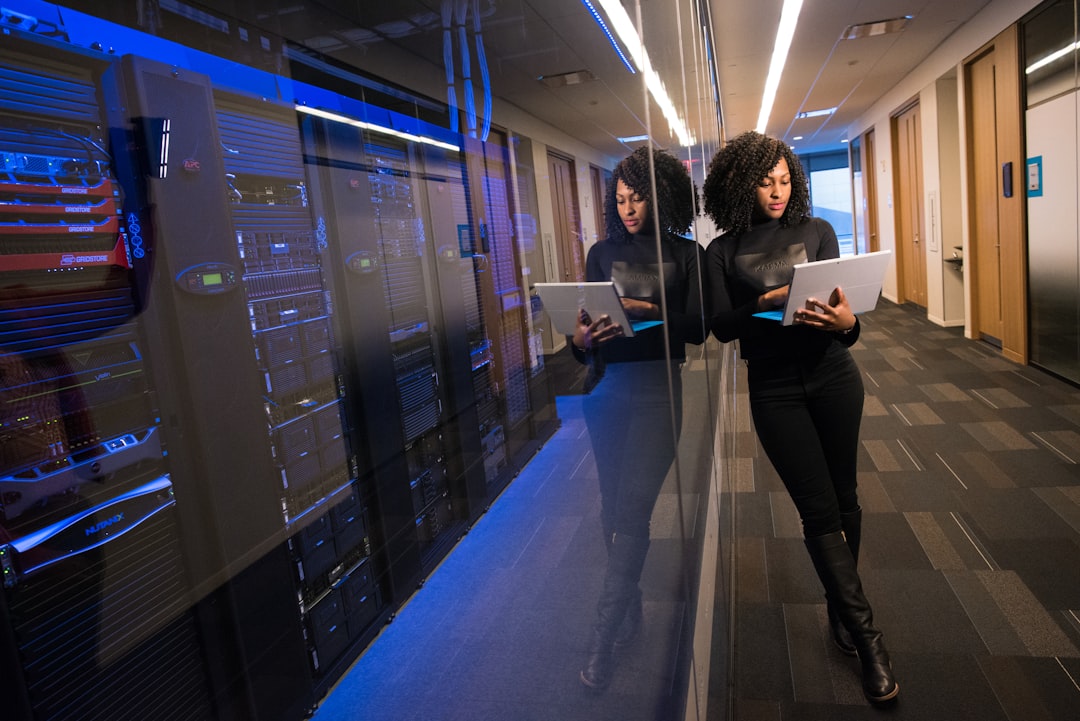Unlock encrypted content
Please enter your SSCE key to initiate on-the-fly decryption.
Decryption key: (Click cancel if you don't have the key)
Copied link to clipboard.
This feature is unavailable for free accounts. Upgrade now and enjoy all Premium benefits.
Go Premium!
This feature is unavailable for free accounts. Upgrade now and enjoy all Premium benefits.
Go Premium!
Please open this page in browser ( Google Chrome or Safari ) to use this feature.
Open In Browser
Digital Transformation: Empowering the Future of File Accessibility and Storage
Random related video for this blog.
Copied share link to clipboard.
This drive for efficiency has given rise to digital transformation, a process that leverages technological advancements to revolutionize the way we store, access, and manage files. From secure cloud storage services to cognitive robotics, this article explores the key elements of digital transformation and their impact on file accessibility and storage.
Digital Transformation: Unlocking the Power of Data
Digital transformation is more than just a buzzword; it represents a fundamental shift in the way organizations operate. At its core, digital transformation harnesses the power of technology to streamline processes, improve decision-making, and enhance the overall customer experience. One crucial aspect of this transformation is the accessibility and migration of data. Data migration is a critical component of digital transformation, enabling businesses to seamlessly transition from legacy systems to modern, cloud-based platforms. This process involves transferring data from outdated storage systems to secure cloud storage services, ensuring easy access, scalability, and enhanced security. By migrating data to the cloud, organizations can eliminate the limitations of traditional storage methods, such as physical storage devices and on-premises servers. Secure cloud storage services have emerged as a game-changer in the realm of file accessibility and storage. These services offer a secure and scalable solution for storing and accessing files from any device, anywhere in the world. With robust encryption protocols and stringent security measures, sensitive data can be safeguarded, mitigating the risk of unauthorized access or data breaches. FileLu, a leading provider of secure cloud storage services, offers a range of premium and free plans, allowing users to store and share files with ease and peace of mind.Cognitive Robotics: Revolutionizing File Search and Organization
The advent of cognitive robotics has further propelled the digital transformation journey, revolutionizing the way we search for and organize files. Cognitive robotics combines artificial intelligence (AI) and roboticsto replicate human cognitive abilities, enabling machines to understand, interpret, and interact with data in a human-like manner. One of the key applications of cognitive robotics in file accessibility is the ability to search for files using advanced natural language processing techniques. Instead of relying on traditional file naming conventions or folder structures, cognitive robotics allows users to search for files using everyday language. For example, users can simply ask, "Find the sales report from last month," and the system will intelligently retrieve the relevant file, regardless of its location or naming convention. Additionally, cognitive robotics can assist in organizing files based on their content and context. By analyzing the content of files, cognitive robots can automatically categorize and tag documents, making it easier to locate and retrieve specific files. This intelligent organization system eliminates the need for manual file management and enhances productivity by reducing the time spent searching for information.
Li-Fi: Illuminating the Future of File Transfer
As digital transformation continues to evolve, new technologies are emerging to address the limitations of traditional file transfer methods. Li-Fi, or Light Fidelity, is one such technology that holds immense potential for the future of file accessibility and storage. Li-Fi utilizes visible light communication (VLC) to transmit data at high speeds, using light waves instead of traditional radio frequencies. This technology has the potential to revolutionize file transfer by offering significantly faster speeds compared to traditional Wi-Fi or wired connections. With Li-Fi, large files can be transferred in a matter of seconds, enabling seamless collaboration and eliminating the frustrations associated with slow transfer speeds. Moreover, Li-Fi offers enhanced security compared to traditional wireless communication methods. Since Li-Fi relies on visible light, it is not susceptible to interference from radio signals and is inherently more secure. This makes Li-Fi an ideal solution for organizations that handle sensitive data and prioritize data privacy.Dystopian Futures and the Ethical Implications of Digital Transformation
While digital transformation presents numerous benefits and opportunities, it is essential to consider the potential dystopian futures that may arise if not managed ethically and responsibly. As technology continues to advance, questions regarding data privacy, security, and the impact on human labor must be addressed to ensure a balanced and sustainable future. One area of concern is the potential displacement of jobs due to cognitive robotics and automation. As machines become increasingly capable of performing complex cognitive tasks, there is a risk of job loss for individuals in certain industries. However, it is crucial to recognize that digital transformation also creates new job opportunities and enables humans to focus on higher-value tasks that require creativity, critical thinking, and emotional intelligence. Another ethical consideration is the responsible use of data. With the vast amounts of data generated and stored through digital transformation, organizations must prioritize data privacy and security. Implementing robust encryption protocols, obtaining explicit consent for data collection, and ensuring transparent data practices are essential for building trust and maintaining ethical standards.Conclusion
Digital transformation is reshaping the way we store, access, and manage files, offering unprecedented opportunities for businesses and individuals alike. From secure cloud storage services to cognitive robotics and emerging technologies like Li-Fi, the future of file accessibility and storage is bright. However, it is imperative to navigate this transformation ethically and responsibly, addressing concerns surrounding job displacement and data privacy. By embracing digital transformation and leveraging innovative technologies, we can unlock the full potential of file accessibility and storage, empowering a more efficient and connected world.Frequently Asked Questions (FAQs)
Question: How can digital transformation benefit businesses and individuals? Answer:
Digital transformation offers numerous benefits, such as improved workflow efficiency, enhanced decision-making, and enhanced customer experience. It enables businesses to optimize their processes and individuals to access files from anywhere, anytime.
Question: What is the role of secure cloud storage services in digital transformation? Answer:
Secure cloud storage services play a crucial role in digital transformation by providing a secure and scalable solution for storing and accessing files. These services eliminate the limitations of traditional storage methods and offer robust encryption protocols to safeguard sensitive data.
Question: How does cognitive robotics revolutionize file search and organization? Answer:
Cognitive robotics leverages AI and robotics to replicate human cognitive abilities. It enables machines to understand and interpret data, making file search more intuitive and efficient. Cognitive robots can also organize files based on content, reducing the need for manual file management.
Question: What is Li-Fi, and how does it enhance file transfer? Answer:
Li-Fi, or Light Fidelity, uses visible light communication to transmit data at high speeds. It offers faster transfer speeds compared to traditional Wi-Fi or wired connections, enabling seamless collaboration and eliminating slow transfer frustrations. Li-Fi also provides enhanced security compared to traditional wireless communication methods.
Case Studies 1. Company XYZ successfully implemented digital transformation by migrating their data to a secure cloud storage service. This enabled their employees to access files remotely, improving collaboration and productivity. 2. The implementation of cognitive robotics at a healthcare facility revolutionized patient record management. The cognitive robots were able to search and retrieve patient files based on natural language queries, reducing administrative workload and improving patient care. 3. A manufacturing company adopted Li-Fi technology for file transfer within their production facility. This significantly reduced transfer times, enabling real-time communication and enhancing operational efficiency.
By Amelia Isabella
Email: [email protected]
Related
The Future of Work: Exploring Parallel Universes, Cloud Storage Reliability,...
June 19, 2023
Read More
Flexible File Sharing Permissions: A Pathway to Enhanced Collaboration and...
June 19, 2023
Read More
Nanotechnology and Cutting-Edge Innovations: Transforming the Future of File Streaming...
June 19, 2023
Read More
Efficient File Sharing and Cybersecurity Solutions: Exploring Tesla Autopilot Protection,...
June 19, 2023
Read More
Robust Downloading Tools and Efficient Data Transfer: Exploring the Benefits...
June 19, 2023
Read More
Title: The Power of Free Cloud Storage: Scalability, Blockchain Technology,...
June 19, 2023
Read More
Cloud Storage for Creative Professionals: Enhancing Collaboration and Efficiency
June 19, 2023
Read More
Popular
Exploring the Benefits of Cloud Storage and Innovative Technologies in...
November 26, 2025
Read More
The Future of Digital Transformation: Exploring Smart Homes, Efficient File...
November 30, 2025
Read More
Latest
The Future of Digital Transformation: Exploring Smart Homes, Efficient File...
November 30, 2025
Read More
Exploring the Benefits of Cloud Storage and Innovative Technologies in...
November 26, 2025
Read More
The Future of Technology: Exploring Biohacking, Space Tourism, and Digital...
November 23, 2025
Read More
The Future of File Sharing: Streamlined Workflows for Photographers and...
November 19, 2025
Read More
Exploring the Intersection of Technology: From Cybersecurity to Augmented Reality...
November 16, 2025
Read More
The Future of File Management: Embracing Edge Computing and Efficient...
November 12, 2025
Read More
The Future of File Sharing: Exploring User-Friendly Solutions and Data...
November 5, 2025
Read More
The Future of Cloud Storage: How FileLu Empowers Creative Professionals...
November 2, 2025
Read More
The Future of Autonomous Technologies: Innovations in Robotics, File Sharing,...
October 29, 2025
Read More
Emerging Technologies Revolutionizing File Management: From Li-Fi to Robust Collaboration...
October 26, 2025
Read More
Emerging Technologies: Exploring the Impact of File Access Auditing, Genetic...
October 19, 2025
Read More
The Future of Data Storage: Exploring Advanced Encryption, Mobile Integration,...
October 5, 2025
Read More
Exploring the Future of Data Management: Security, Efficiency, and Cognitive...
September 28, 2025
Read More
Revolutionizing Data Management: Innovations in Storage, Security, and Sustainable Technology.
September 24, 2025
Read More



















